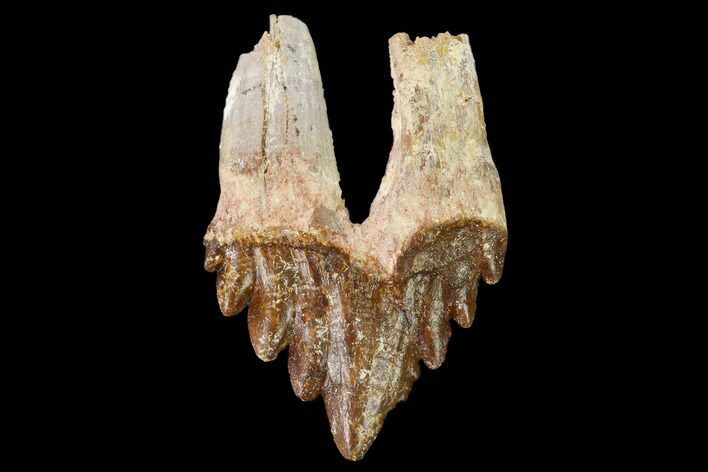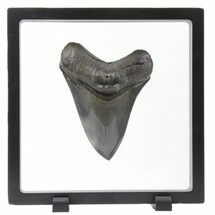This Specimen has been sold.
2.7" Fossil Primitive Whale (Basilosaur) Tooth - Morocco
This is a 2" long tooth from a Basilosaurid, a type of Archaeocete (primitive whale). These rare teeth come from the Late Eocene aged deposits in the Western Sahara near Dakhla, Morocco and are associated with teeth of the shark Auriculatus, a Megalodon ancestor. My best research indicates the most likely species is the Basilosaur, Zygorhiza kochii, but I'm leaving a question mark on that because it's not definitive.
These teeth are nearly always found fractured and require repair work. About 20% of the crown of this tooth has been restored, which includes restoration to each lateral ridge and gap fill through multiple repaired cracks.
These teeth are nearly always found fractured and require repair work. About 20% of the crown of this tooth has been restored, which includes restoration to each lateral ridge and gap fill through multiple repaired cracks.
Basilosaurids could reach gigantic sizes, with some species reaching nearly 60 feet in length. They likely fed on fish, sharks, and sea birds with teeth optimized for catching and chewing prey. The front teeth in the jaw were pointed for catching and holding fish while they had very uniquely shaped, double rooted molars for chewing.
The Middle to Late Eocene formations of Southwestern Morocco contain a diverse fauna of Basilosaurs, including more than half a dozen described species of the genera Dorudon, Stromerius, Saghacetus, Eocetus, Platyosphys and Basilosaurus. Fossil teeth are nearly identical between Basilosaur species, so other than using tooth size and exact horizon the teeth were collected from (which is not known) to narrow down the species, there is no way of assigning an isolated tooth to a specific species. These teeth have often been labeled as the genus Zygorhiza in the past, but based on new research into the archaeocete faunas of Morocco, it does not appear this genus is found there.
Several papers on the Basilosaurs of southwestern Morocco can be found below.
New marine mammal faunas (Cetacea and Sirenia) and sea level change in the Samlat Formation, Upper Eocene, near Ad-Dakhla in southwestern Morocco
New fauna of archaeocete whales (Mammalia, Cetacea) from theBartonian middle Eocene of southern Morocco
Stomach contents of the archaeocete Basilosaurus isis: Apex predator in oceans of the late Eocene
The Middle to Late Eocene formations of Southwestern Morocco contain a diverse fauna of Basilosaurs, including more than half a dozen described species of the genera Dorudon, Stromerius, Saghacetus, Eocetus, Platyosphys and Basilosaurus. Fossil teeth are nearly identical between Basilosaur species, so other than using tooth size and exact horizon the teeth were collected from (which is not known) to narrow down the species, there is no way of assigning an isolated tooth to a specific species. These teeth have often been labeled as the genus Zygorhiza in the past, but based on new research into the archaeocete faunas of Morocco, it does not appear this genus is found there.
Several papers on the Basilosaurs of southwestern Morocco can be found below.
New marine mammal faunas (Cetacea and Sirenia) and sea level change in the Samlat Formation, Upper Eocene, near Ad-Dakhla in southwestern Morocco
New fauna of archaeocete whales (Mammalia, Cetacea) from theBartonian middle Eocene of southern Morocco
Stomach contents of the archaeocete Basilosaurus isis: Apex predator in oceans of the late Eocene
SPECIES
Unidentified Basilosaur
AGE
LOCATION
Dakhla, Western Sahara, Morocco
FORMATION
Samlat Formation
SIZE
2.7" long
CATEGORY
SUB CATEGORY
ITEM
#164753
We guarantee the authenticity of all of our specimens.
 Reviews
Reviews













